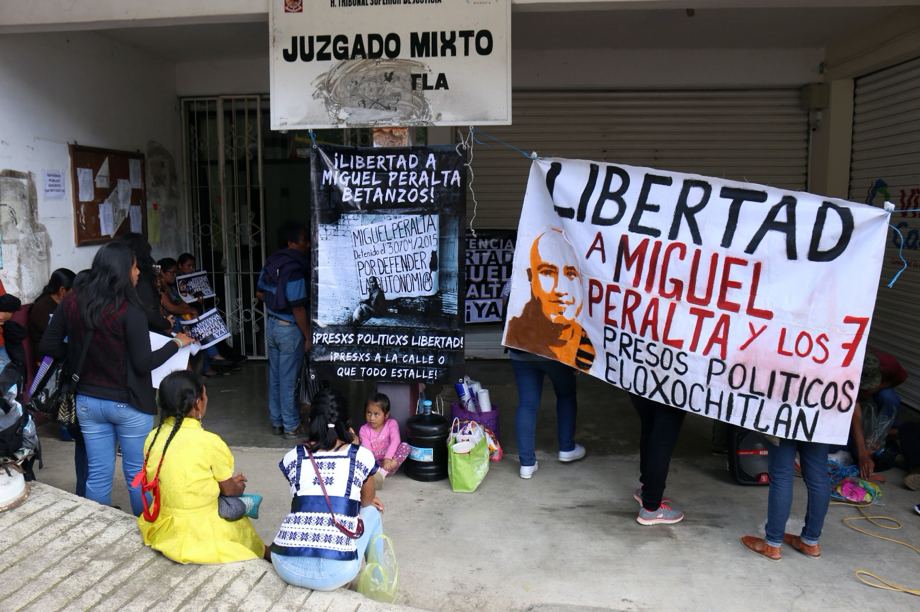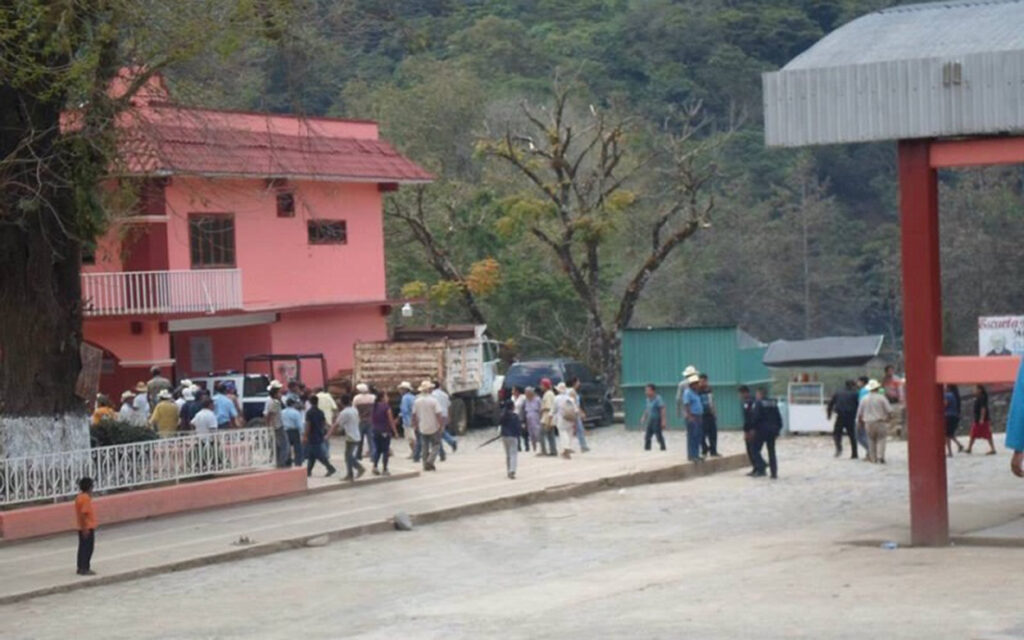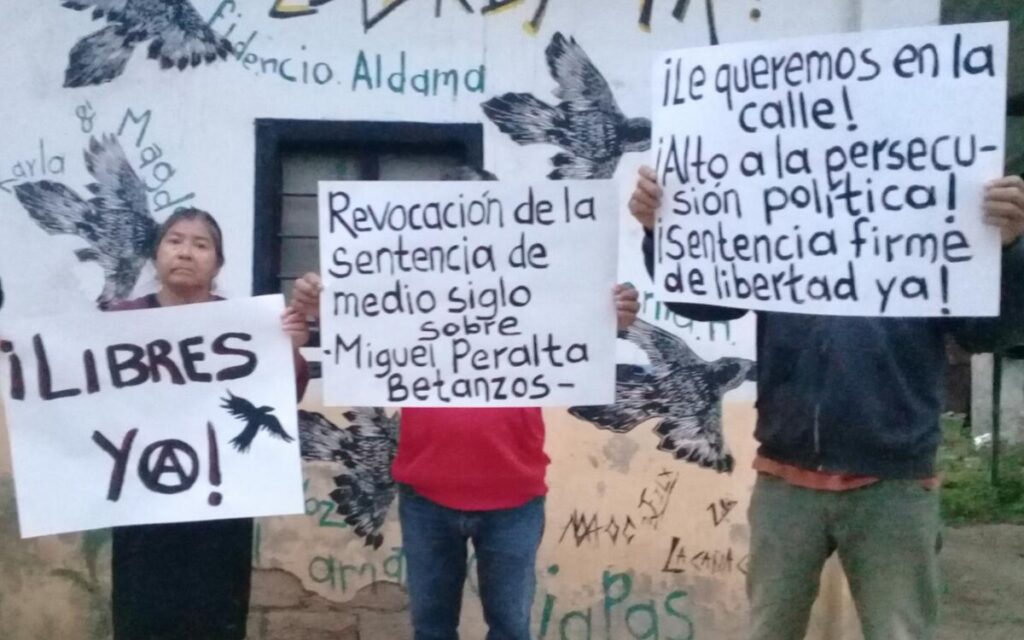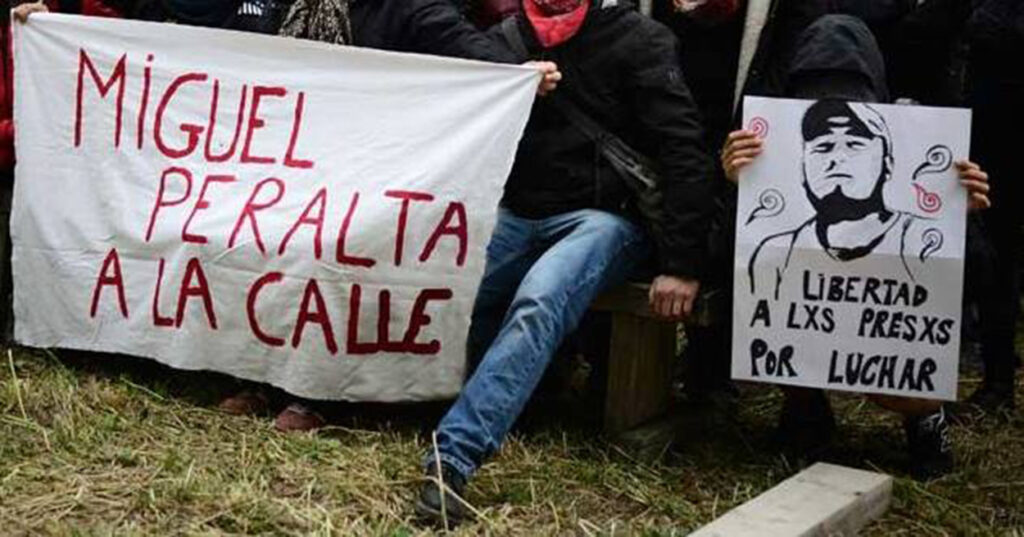Cover photo: Protest demanding freedom for Miguel Peralta. September 2019. Photo: Daliri Oropeza
The ruling on an appeal filed by the legal defense team of the former Mazatec political prisoner, Miguel Peralta, seeking to overturn his conviction, has once again put his freedom at risk. A member of the community assembly of Eloxochitlán de Flores Magón, Oaxaca, Peralta is one of 35 assembly members who have been persecuted, accused of the homicide of Manuel Zepeda Lagunas, and the attempted homicide of his sister, Elisa Zepeda, both members of the same Mazatec community.
The root of what Peralta’s lawyer argues is criminalization, are the violent events which took place in December of 2014, when the community assembly was attacked by an armed group. Community members clarify that the armed group was beneath the command of the Zepeda cacique family.
Members of the community assembly explain that since 2010, when Elisa’s father, Manuel Zepeda Cortés, became municipal president, he began a campaign of repression against the community organization in order to consolidate his power in the Mazatec community.
Roberto López, member of the collective Los Otros Abogadoz, and Peralta’s lawyer, says that while the assembly gathered in the center of town for the election of municipal authorities that winter of 2014, shots were fired at the assembly from the municipal building, where Elisa and Manuel Zepeda had previously installed themselves.

The attack left people with gunshot wounds, provoking the death of Elisa’s brother, Manuel Zepeda Lagunas. Manuel had been detained by inhabitants of Eloxochitlán while wielding a weapon designated exclusively for military use, and was being turned over to the authorities. “Unfortunately for them, he died. In that moment, instead of turning him over to the authorities, these inhabitants of Eloxochitlán were accused of being responsible for the homicide,” says the lawyer.
According to his legal defense, although Peralta was in Mexico City on the day of the events, he was accused of homicide, arbitrarily detained, and transferred to Oaxaca. Peralta was in prison for more than four years until October 2019, when he was freed.
However, his sentence of freedom was overturned in March of 2022. After an appeal filed by the accusing party, a new arrest warrant was issued against him to serve a sentence of fifty years in prison. Against that, Peralta’s legal defense team filed an appeal for due process violations and the fabrication of evidence.
On August 17, a federal collegiate tribunal ruled on the appeal, which Roberto López argues exacerbates the legal situation of the former political prisoner. “They turned us back seven years in time,” explains the lawyer. He specifies that the process was returned to the stage before the sentencing, to the presentation of evidence and cross-examinations.
“They returned the legal process to where the other prisoners currently stand (in reference to the other political prisoners of Eloxochitlán), those who have not received a conviction or a sentence…because the magistrates didn’t seriously study the issue, they only dealt with a superficial issue (redoing the testimonies). While they disguise this as addressing a due process violation, in reality, the intention is to continue giving control of the process to Elisa,” says Peralta’s lawyer.
López asserts that throughout the legal process, Manuel and Elisa Zepeda have used a strategy of delay, managing the conflict and maintaining “hostage” the other prisoners from the events of 2014.
The danger, the lawyer accentuates, is that in order to return to that part of the process, Peralta would have to face detention. “What this means is a setback of at least seven years of my legal process, and the continued insistence on my imprisonment,” claimed the Mazatec through a letter shared last week. For this reason, the legal defense filed another appeal for a review of the most recent resolution, with the intention of having the Supreme Court resolve the appeal, which could happen in the next four to five months.
Below, we share extracts from a conversation we had with Roberto López, who warns that the persecution against Peralta is intensifying.
Avispa Midia (AM): With the recent resolution, which part of the process is being reinstated?
Roberto López (RL): The resolution returned us to the cross-examination stage…a part of the process where they refused to attend. If they do not appear, we will have to wait until they do so, in order for them to give their testimonies and be cross-examined. The conclusions will then be presented, the final hearing will take place, and a new sentence will be issued. I am not exaggerating when I say that this ruling turns us back approximately seven years in time. They continue to control the conflict. With this resolution, the collegiate tribunal gives Elisa the power to continue controlling the process.
The events took place on December 14, 2014. To begin presenting evidence, one of the first hearings didn’t take place until January 30, 2017. Manuel and Vicente Zepeda were present only because they had a hearing as defendants for acts that the community assembly had denounced, injuries and torture, taken up by the public prosecutor’s office.

Elisa was counseled and her lawyers recommended that she not present herself at the court to give her testimony. The court was never willing to fine or arrest her for not appearing. The court never did anything. Finally, on September 30, 2017, her and three other witnesses presented themselves to give their testimonies.
AM: What are the principal contradictions in the testimonies that were not taken up in the most recent resolution?
RL: When we presented the appeal in 2022, we highlighted the testimonies against Miguel, which are an essential part of the process. The testimony of Elisa Zepeda, of her father, and of the seven witnesses who accuse Miguel. That is the fundamental part that must be questioned. In fact, these testimonies were already put in doubt during the process. In emphasizing the contradictions in these testimonies, other codefendants of Miguel have been freed.
We did an analysis of what Elisa Zepeda and the witnesses first said to the public prosecutor, and what they said in the hearings before the court. They were different things, contradictory statements.
There was a witness, Eleazar Hernández Ordaz, an old man, who in the legal file accuses Miguel. His testimony is a carbon copy of the testimony given by Manuel Zepeda, the father of Elisa. In court, when it was his turn to give his testimony, he explained that he never gave the aforementioned testimony. They show him the testimony. “Is this your signature?” “Yes, that is my signature, but I don’t remember.” Fernando Ramírez Carrera, another witness, says that he never gave any testimony. His signature appears, but he says he never gave testimony to the public prosecutor.
Elisa’s uncle, Vicente Zepeda, says that throughout that day’s events, he was with Elisa. She gives extensive testimony with many details. Details that Vicente doesn’t give. And when he is questioned in the hearing, seeing that there were many things in her testimony that he had not mentioned, he says, “I saw them when they entered, but they hit me on the head, and I lost consciousness. I fainted and I don’t remember anything else,” so as to not contradict Elisa’s testimony.
You might be interested in- Resolution Pending in Case of Miguel Peralta Betanzos
Everyone will maintain the same testimonies and we will go to sentencing. This will not change the resolution to come. When Elisa reiterates the accusation, her witnesses will obviously say that they recognize Peralta, that they saw him in the location of the acts, and that will lead to a conviction. That, in turn, will again lead us to an appeal.
AM: What elements do you consider to be decisive in the recent ruling on the appeal?
RL: The events took place in 2014. From there, Elisa began to construct a discourse of victimhood. She approaches some human rights organizations and they support her as a defender of women’s rights. Like that she moves her way up to municipal presidency of Eloxochitlán. She is president for one year, before she renounces her position in order to run for local representative of the 64th legislature of the State Congress. She wins with the political party MORENA. During her three years as local representative, she is named president of the Permanent Commission of Justice of the State of Oaxaca. This means that she is in charge of naming judges, magistrates, local prosecutors. She begins to have relations with people from the state prosecutor’s office, those who prosecute, and people from judicial power, those who sentence. From my perspective she weaves together these networks and alliances.
All this makes possible that in 2022, Miguel’s sentence of freedom is overturned. There have already been many resolutions freeing other prisoners of Eloxochitlán and very few of those resolutions of freedom have been overturned. Miguel’s was overturned. For me, this is a consequence of her position of political power, maintaining alliances with those who hold judicial power.

Then comes Salomón Jara’s campaign for governor. She joins his team and is named Secretary of Women, a secretary in the government of Salomón Jara. From that position, she continues utilizing the resources she has, continues utilizing her political power, to influence the situation.
For us, she influenced the resolution of the collegiate circuit tribunal which ruled on Miguel’s appeal. It was there because the appeal sought his freedom for all the violations, for all the precedent. And no, on the contrary, they turn us back seven years in the process. With that, we know that this is more than legal, it is political. Elisa Zepeda has utilized the death of her brother to maintain power, to climb the political ladder. She doesn’t want her discourse to collapse because if it does, it will show that everything she has constructed, her entire political trajectory, was a lie.
From that position of power, she is confronting the prisoners of Eloxochitlán. Those who are still in prison, and those being persecuted, as is the case of Miguel…she continues with this thirst for revenge against the prisoners, because if they are all released, her discourse collapses.
AM: What is the response to the recent ruling?
RL: We analyzed it and we said no, this is a set-up. They want Miguel to return to prison under the pretext that they are reinstating the process so that he can be cross-examined alongside Elisa. That resolution doesn’t help us. Thus, we have sought that the Supreme Court review the ruling on the appeal. Let the justices determine if that appeal was properly ruled upon, and if the resolution is correct.
We want the Supreme Court to review the resolution to the appeal and rule on the fundamental violations that exist in this process. Among them are false accusations of Elisa and her witnesses, accusations that have already been questioned, and have already been put in doubt. There are resolutions which released other codefendants. There are resolutions, including in the chambers of the Supreme Court of the State of Oaxaca, also of district courts, where they say that the testimonies of Elisa and her witnesses are not credible. There are contradictions, there are inconsistencies, and we want the Supreme Court to not evade their responsibility. The issue of these political prisoners is a significant issue for society. We cannot allow that by means of political power, a person is influencing the legal process, falsely accusing those who oppose the cacique project of her family.

With the contradictions of the witnesses and the delay in the legal process, we have a lot of partisanship to face in the courts. Adding to the contradictions, are the judges, the court clerks, the public prosecutor, who in the nine years of this process, has been the same. Judges have been changed, court clerks have been changed, but the public prosecutor, who began the process, continues there because they are a key figure for Elisa Zepeda, for Manuel Zepeda.
It is very important for society that the Supreme Court review this appeal. If the Supreme Court rejects us, we would be practically proving that access to justice in this country continues to not exist. Because in the end, the pathway to justice would be closed off. They need to take up their responsibility, to demonstrate the independence between judicial and government power. We have faced an unequal process, with many irregularities, partisanship, and many contradictions in the testimonies of the witnesses. More than being legal, this conflict is political, and it is being managed by Elisa Zepeda in the manner that she pleases. Nine years and there is no sentence for anybody. Nearly nine years of this legal process without a sentence. I think that is significant, and whatever honest, impartial judge who observes that would have to order their release.


